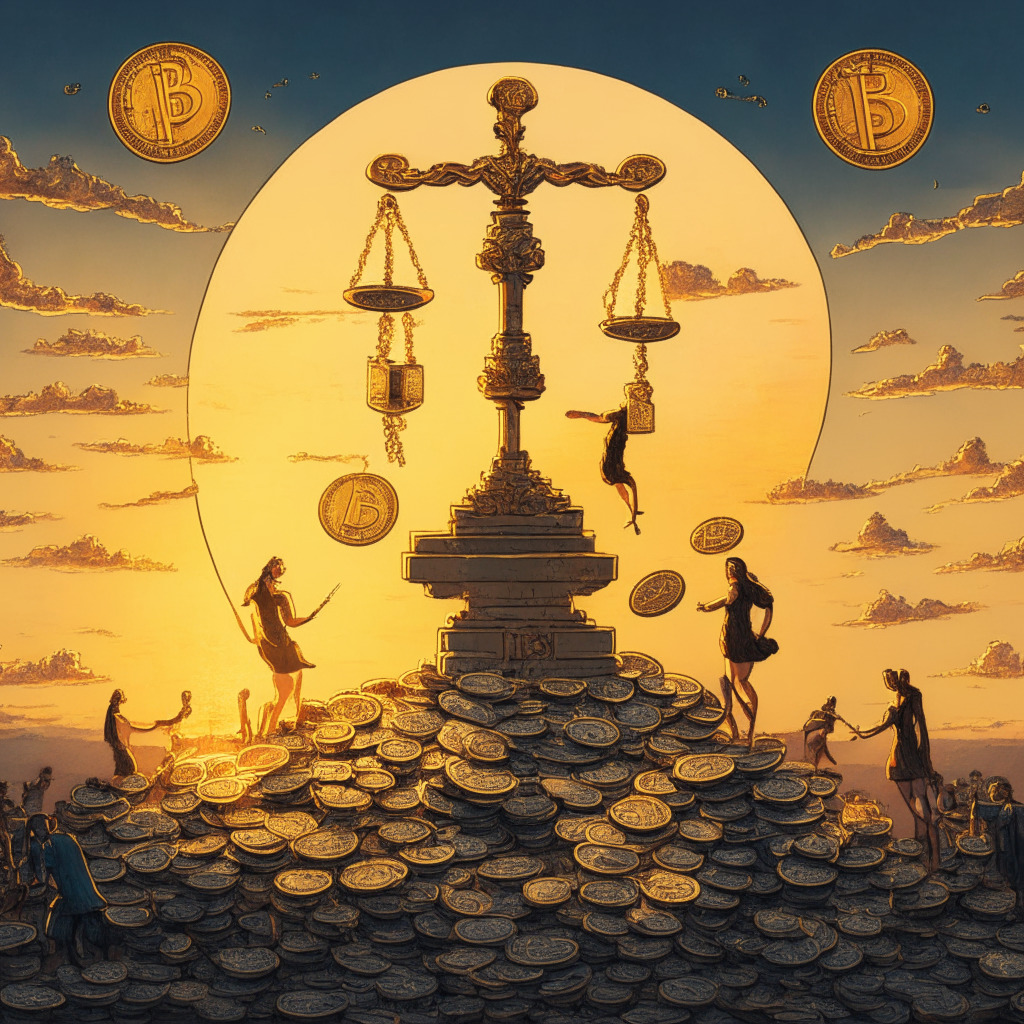“Saudi Arabia’s shift from an oil-dependent economy to investing in blockchain gaming and Web3 captures attention. This redraws its economic blueprint under its ambitious Vision 2030 plan. With gaming sector investments on the rise, the kingdom seeks to explore the new internet wave, potentially positioning it as a global gaming hub.”
Search Results for: Crystal Blockchain
Unveiling MetaCene: Revolutionizing Blockchain Gaming or Creating a Risky Bubble Economy?
MetaCene, a next-generation blockchain MMORPG developed with an investment of $5 million, aims to redefine civilizations through player interactions with in-game non-fungible tokens (NFTs). Incorporating AI and blockchain technologies, MetaCene departs from conventional gaming, focusing less on financial gain and more on pure gaming experience.
North Korean Blockchain Heist: Unraveling the $37.3M CoinsPaid Cyber Breach
“Cryptocurrency platform CoinsPaid experienced a breach resulting in a $37.3 million loss, suspected to be orchestrated by state-backed Lazarus Group. Depicting the latent risks of crypto and systemic vulnerabilities, the incident emphasizes the necessity for robust security measures in the crypto-space.”
Predicting Bitcoin Transaction Fees: The New Crypto Crystal Ball
Rather than focusing on short-term price predictions, this article suggests examining Bitcoin transaction fees as they naturally increase with emerging use cases and growing interest in cryptocurrency. As layer-1 applications evolve, understanding and predicting fees could benefit the entire Bitcoin community, driving growth and innovation.
Investor Sentiments Divide in the Blockchain and Digital Assets Industry: Shift or Solidify?
The Goldman Sachs report “Family Office Investment Insides” reveals that 32% of family offices hold investments in digital assets, with 19% driven by their belief in blockchain technology. However, interest in potential crypto investments has sharply decreased to 12% in 202>Title
Crypto Crystal Ball: Haseeb Qureshi’s Contrarian Takes on Market, Regulation, and Ponzi Schemes
Haseeb Qureshi, managing partner of Dragonfly Capital and moderator of the popular crypto podcast “The […]
Huobi’s $7.9M Heist: A Tenuous Deal and the Shadow of Lazarus Group
Global cryptocurrency exchange Huobi recently experienced a cyberattack, resulting in the theft of approximately $7.9 million worth of ETH. Huobi identified the culprits and offered them a 5% reward on the returned funds, even proposing a role for the hacker as a security consultant. However, failure to comply will lead to legal action.
Regulating the Crypto Frontier: Stifling Innovation or Safeguarding Investors in Ukraine?
The National Bank of Ukraine’s increased control over local crypto firms has been met with concern. The bank’s demand for full financial transparency raises questions about the potential stifling of this burgeoning industry. Yet, despite the harsh regulatory landscape, the Ukrainian market holds untapped potential, suggesting that this regulatory turbulence could drive Ukrainian crypto stakeholders towards international success.
Digital Assets in War: Analysing Ukraine’s Crypto Boost amid Russian Conflict
Ukraine has benefited from the decentralized nature of cryptocurrencies amid the Eastern European conflict, with $225 million worth flowing into the country for essentials such as weaponry and medical supplies. Despite slowing donations, financial backing persisted. Notably, most contributions geared towards humanitarian initiatives than military operations. USDT emerged as the primary donation currency, followed by Ether, Bitcoin, and others. Contrastingly, Russia’s crypto fundraising has been lesser and subtle. Technology and economic strategy in crisis times aren’t free from potential manipulations and concealed transactions.
Cryptocurrencies in Conflict Resolve: Israeli Cyberspace Crackdown vs. Crypto Aid Israel
The Israeli police cyber unit and Binance tackled Hamas’ attempts to raise funds via cryptocurrency while Crypto Aid Israel, supported by Fireblocks, was established to receive cryptocurrency donations for displaced citizens securely. The growing cooperation could potentially link cryptocurrency assets and traditional banking, crystalizing a hybrid financial future vision.
Russian Legislator Predicts Global Foray of Digital Ruble by 2025, Possible Shift in International Trade
A high-ranking Russian legislitor, Anatoly Aksakov, predicts that domestic corporations will utilize the nation’s digital ruble, a Central Bank Digital Currency (CBDC), by 2025, especially in Latin American nations. He also suggested potential usage could transform “mutual settlements” among these nations.
Dwindling Dominance: Binance Market Share’s Alarming Plunge amidst Regulatory Heat
“Binance, a major player in the crypto space, has seen a notable decline in market share among non-dollar crypto exchanges. Co-founder, Yi He, has urged employees to focus on product conceptualization and improving client experiences, disregarding regulatory pressures and competitors’ expansions.”
AI and Creativity Clash in Hollywood: A Balance between Human Genius and Digital Progression
“The approved deal in the Writer’s Guild of America strike underscores AI can’t write or rewrite literary material, thus cannot affect a writer’s credit. Additionally, upon company consent and adherence to policies, a writer can use AI for writing services.”
Unveiling the Legal Challenges in Crypto: The Case of Sam Bankman-Fried and its Consequences
“Sam Bankman-Fried’s failed appeal serves as a warning for the crypto industry against violating regulatory standards. This legal setback might push the industry towards improved accountability and streamlined regulation. The regulatory future of crypto remains complex, highlighting the need for improved dialogue and decision-making in crypto regulations.”
Navigating the Tides of Change: Google’s Green Light and the Unpredictability of the NFT Sphere
Google has greenlit advertisements for NFT games, providing a new visibility avenue for decentralized games. However, this decision excludes games promoting gambling. Insurance giants display caution towards NFTs while a security breach raises safety concerns. Meanwhile, geographical adoption of the Metaverse shows contrasting trends between the East and West.
Swiss Sheltering TON Foundation: Non-Profit Evolution, Regulatory Transformations, and Crypto Exodus
“The Open Network (TON) blockchain has pivoted into a Swiss-based non-profit, focusing on fostering the TON ecosystem and broadening its adoption. The TON Foundation plans to stimulate TON-centric scholarly and creative ventures, while making strides towards transparency and community-driven governance in a quest to become the primary platform for Web3 dapps.”
Exploring the Forces Shaping Bitcoin’s Spiraling Rise Above $27,000: A Market, Technical, and Global Outlook
“Bitcoin (BTC) has surged above $27,000, a jump many credit to Grayscale’s recent legal victory to turn its Bitcoin Trust into an ETF. Global cryptocurrency market capital grew roughly $50 billion in a day, raising hopes for future growth. Factors such as increasing acceptance of crypto by countries like Netherlands and endorsements by US figures further strengthen the market’s legitimacy.”
Unraveling Russia’s Digital Ruble: Combatting Corruption or Dodging Sanctions?
“The adoption of blockchain technology, like Russia’s digital ruble, offers potential to combat corruption by shrinking the shadow economy. It provides transparency in transactions and the possibility of reducing grey economy risks. Special offline wallets also allow it to reach areas where the internet hasn’t yet penetrated.”
Unraveling Legal Complexities in Decentralized Finance: Case Study of 3AC’s Kyle Davies
This excerpt captures the key points of the article: “The court case involving Three Arrows Capital underscores the complex jurisdictive issues in regulating blockchain technology, particularly in cases involving non-US citizens. The incident illustrates the challenges regulators face when addressing decentralized technologies spanning transnational boundaries, highlighting the urgent demand for a global crypto law overhaul.”
PayPal’s New Stablecoin PYUSD: Exploring its Potential and Uncertainties
“PayPal’s recently unveiled stablecoin, PYUSD, is predicted to enhance payment efficiency. Despite optimism, reception may vary due to competition from central bank digital currencies and yield-bearing stablecoins. Current investors appear unbothered by the lack of yield and focus on safety and availability.”
Navigating the Stormy Seas of Digital Assets: Promising Advances and Regulatory Pitfalls
“The digital assets landscape is dynamic, but not insulated from regulatory scrutiny. Despite substantial backing, some ventures like Nifty’s struggle, while partnerships like Tel Aviv Stock Exchange and Fireblocks demonstrate promising blockchain confidence. However, the translation of tech potential to market reality presents challenges.”
Cryptocurrency Wealth: A Magnet for Modern Home Invasions
“In Richmond, high-value cryptocurrency investors face increased home invasion risks, with criminals posing as delivery drivers to gain access. This shift highlights vulnerabilities beyond digital or market-driven risks. The decentralized nature of cryptocurrencies simultaneously brings freedom, potential financial returns, and personal safety threats, marking a critical evolution in the blockchain future.”
Predicting Bitcoin’s Price: The Potential Rise to $130,000 by 2025 Explained
Bitcoin’s finite supply and increasing demand could drive its price to an estimated $130,000 by 2025. This price point, largely speculative, considers the number of Bitcoin addresses with a balance as a reliable factor, indicating the potential interest of investors.
Ripple’s Partial Legal Victory: A Shift in Crypto Legislation or a Fleeting Triumph?
The New York court’s recent ruling in the Ripple case provides partial clarity on the controversial issue of compliance with securities legislation. Despite Ripple’s partial victory, the blockchain platform’s institutional token sale still oversteps federal securities laws. The court’s decision sparked a 24% increase in XRP price, demonstrating regulatory considerations’ significant impact on crypto markets.
Atomic Wallet Hack: Uncovering Causes, Tracking Funds, and Strengthening Security
Atomic Wallet recently disclosed new details about its June 3 hack, affecting less than 0.1% of its users. The company is working to recover lost funds and collaborating with exchanges and blockchain analysis firms Chainalysis and Crystal. While the total amount stolen remains undisclosed, Elliptic reported a figure of over $100 million, with possible links to the North Korean hacking group Lazarus.
CoinDeal Debacle: A $45 Million Reminder on Investor Vigilance & Crypto Regulation
The CoinDeal crypto fraud scheme, involving blockchain technology and metaverse investments, defrauded over 10,000 investors of $45 million. Recent criminal charges highlight the need for proper regulations, enforcement of existing laws, and investor vigilance in the fast-paced crypto market.
























